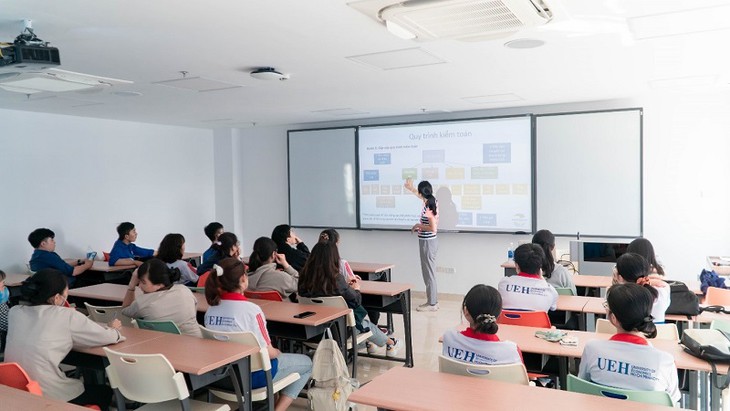
Spreading zero waste models to the public will take time, patience, and a long-term plan. Setting up a zero waste lifestyle needs to be ingrained into people’s consciousness.
The University of Economics Ho Chi Minh City (UEH) has become the first ever zero-waste school in Vietnam after launching an initiative to promote zero-waste practices on its campus in Binh Chanh district.
In October its Zero Waste Campus won the international competition “Zero Waste Cities Challenge”, organized by Waste Aid.
In the first phase of a project called ‘Rethink – Be Green’ UEH expects to reduce plastic refuse on the campus 40% and give 70% of its students and staff an understanding of zero-waste practices.
According to Le Thi Hanh An, Director of the University’s Zero Waste Campus project, “This project is the first step in UEH’s journey toward sustainability by 2025 and achieving the UN’s 17 sustainable development goals.”
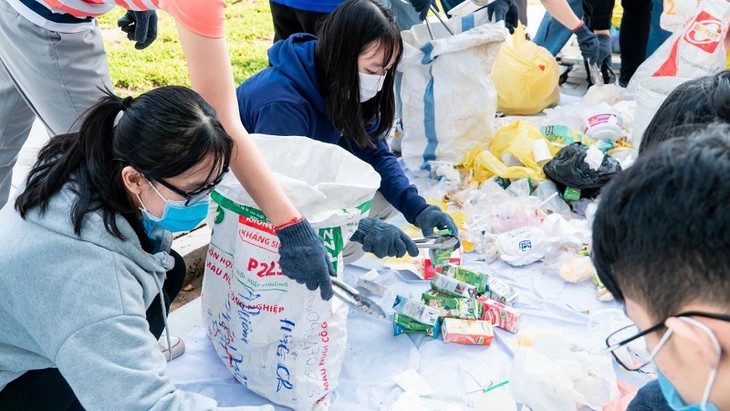
An told VOV that the project encourages adoption of 3R technologies to sort and recycle waste, and practices human-centered education and communication to promote the circular economy.
“In fact, zero waste doesn’t mean without any waste. It’s necessary to understand that anything can become a useful resource if treated in a proper way. The UEH’s Zero Waste Campus is expected to empower students to become global citizens, to act for sustainable growth, and to help younger generations understand what they can do to achieve a circular economy,” she explained.
In Hanoi, Genesis Kindergarten and Primary School was the first school to create a green community of teachers, parents, and students. They practice “green education” and implement a “green lifestyle” through sustainable actions.
Nguyen Trung Hieu, who is in charge of student affairs at Genesis, has a habit of sorting all daily kitchen waste, except meat leftovers, to make compost on his terrace.
Hieu, who used to work with NGOs on environmental protection, said his habit has grown stronger because he and his new agency, Genesis School, share the same goal – to educate people about sustainable development.
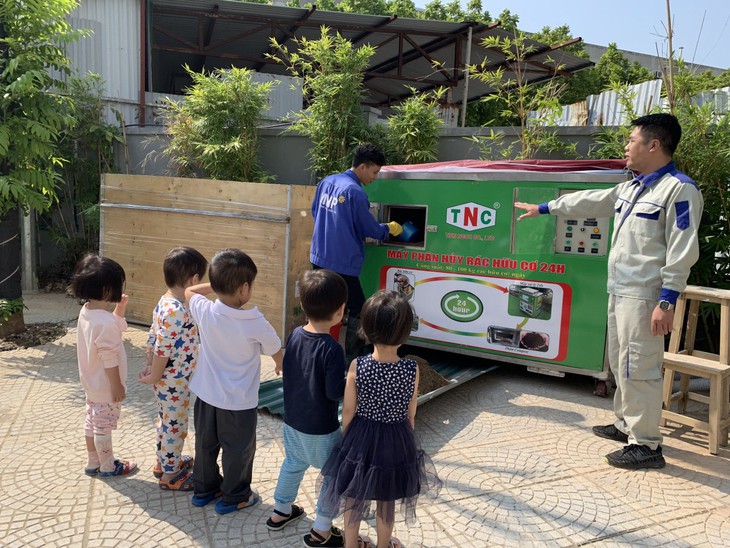
“Under the school’s education philosophy on sustainable development, all 17 UN sustainable development goals have been included in the school’s official curriculum. Each week, half the classes have a session on sustainable development. For example, all the first graders will learn about poverty or inequality reduction. All classes have a sustainable development theme with topics that include waste, plastic, or trash-based art projects,” said Hieu.
Although the Genesis School officially began its zero waste model last September, the school has been organizing waste treatment activities since its establishment.
Before the coronavirus pandemic broke out, training sessions on waste sorting were organized for students and staff. Wastebaskets were placed in corridors, in the school canteen, and in the school yard.
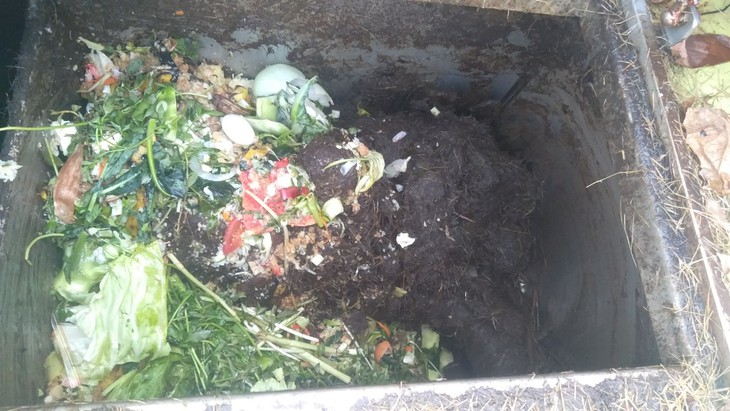
Food suppliers were asked to minimize single-use products and leftover food in the canteen was classified as organic waste to be moved to a waste treatment machine for recycling into compost. The machine can treat 80 to 100 kilos of organic waste in 48 to 72 hours.
To realize the school’s mission of “Nurturing A Green Future”, a “Green Team” was organized from Genesis staff, teachers, parents, and, in the future, students.
Nguyen Thi Chuyen, a Genesis employee and member of the “Green Team”, said that she wants to help people in the community where she lives and works learn about the importance of reducing waste.
She added, “Zero waste doesn’t mean without any waste. It aims to develop a production and consumption mode which increases the responsible reuse and recovery of products, packaging and waste in a sustainable way, a way that doesn’t harm the environment, people’s health, and the ecosystem around us.”
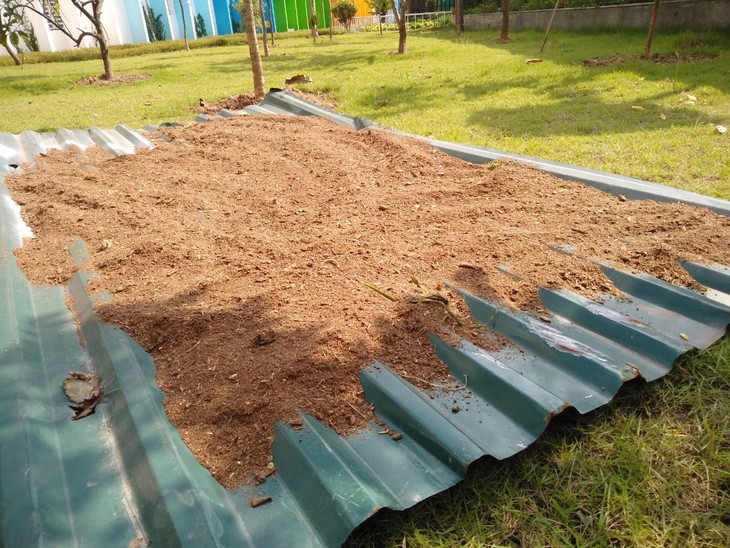
Due to social distancing, the Genesis School held several online activities in October to focus the school’s teachers, parents, and students on organic waste management at home while students were waiting to return to school.
More importantly, Hieu said the model being applied in his school is in line with the motto “Education should start at a young age”.
“My school’s green project combines the UN’s SDGs in classes where students make things from recycled items. The pandemic has forced students to make those things at home with the help of parents. We know that doesn’t convey the environmental messages as well as classes in person, but we believe the interaction helps children get an initial understanding and gains their trust. We hope that when they return to school, they’ll be able to carry out such projects even better,” said Hieu.
The zero waste models that UEH and the Genesis School are applying are in collaboration with the environmental nonprofit Vietnam Zero Waste Alliance (VZWA).
What both schools want to do in the initial period is educate as many people as possible about the zero waste approach and incorporate zero-waste practices into their daily lives.
Because project participants are trying to expand public awareness and habits, a great number of activities must be organized, including communications, contests, and forums, said Chuyen of the Genesis School.
“The Genesis School has integrated these zero-waste activities into the school curriculum. Specific instructions and notice boards for daily routines are hung in accessible places at the school to remind students and staff. A number of our students and teachers have established a habit of following zero waste practices and spread it to the people surrounding them,” said Chuyen.
Le Gia Huy, a member of the Secretariat of the UEH Students’ Association, has this to say, “I think we need to combine the ‘UEH Zero Waste Campus’ program with activities that Generation Z students pay attention to, like music and TikTok video competitions. Students will accept these approaches more readily and will gradually develop their own green, zero-waste lifestyle.”
Hanh An of the UEH said, “Because our project started with education and awareness and behavior changing through online channels, we haven’t faced too many difficulties from the pandemic. In the near future when students are back in school, we’ll carry out the component of garbage collection, sorting, and waste recovery, and launch a large-scale communication campaign in both online and direct formats on waste sorting. A contest on using a smart education platform to change the perceptions and behavior of UEH students in a fun and competitive way will be held.”
Spreading zero waste models to the public will take time, patience, and a long-term plan. Setting up a zero waste lifestyle needs to be ingrained into people’s consciousness, said Huy of the UEH.
_____________________
Courtesy: Voice of Vietnam